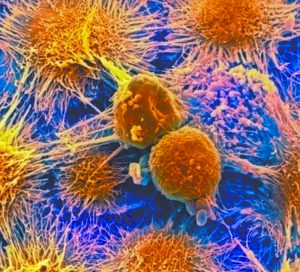 The development of improved screening tests for various types of cancer means that physicians can now identify and diagnose cancer at an earlier stage, many times, before any symptoms are present. Early detection is important because when abnormal tissues or cancers are found early, they are easier to treat. Some screening methods are quite simple, such as skin cancer checks or breast self-examination, while others, such as certain genetic tests, are extremely sophisticated. Whether easy or more complicated, regular screenings for cancer have been shown to be effective in reducing the number of cancer deaths, according to the American Cancer Society (ACS).
The development of improved screening tests for various types of cancer means that physicians can now identify and diagnose cancer at an earlier stage, many times, before any symptoms are present. Early detection is important because when abnormal tissues or cancers are found early, they are easier to treat. Some screening methods are quite simple, such as skin cancer checks or breast self-examination, while others, such as certain genetic tests, are extremely sophisticated. Whether easy or more complicated, regular screenings for cancer have been shown to be effective in reducing the number of cancer deaths, according to the American Cancer Society (ACS).
Recommended Cancer Screening Tests
Skin Cancer: Screening for skin cancer involves checking your skin and any moles, or having a doctor check them, for changes that could be signs of cancer. An annual skin check by a dermatologist or regular physician is recommended for those with a family history of skin cancer.
Breast Cancer: In addition to monthly self-examinations, the ACS recommends that, starting at age 40, all women should have annual screening mammograms; other health organizations call for mammograms every two years, starting at age 50, but stopping screening after age 75. Talk to your doctor about what is right for you, based on your own family health history and your cancer risk factors.
Cervical Cancer: An annual Pap test is advised for all women, beginning at age 21. Women from 21 to 29 should have a Pap test every three years. Beginning at age 30, ACS recommends a Pap test, combined with human papilloma virus (HPV) testing, every five years. Testing should continue until the age of 65. Following these guidelines can also increase the likelihood of finding pre-cancers, which can be treated to prevent cervical cancer from developing.
Colorectal Cancer: Colonoscopy screening for colorectal cancer should start at age 50, and be done every 10 years, unless recommended more often by your doctor, until age 75. This type of screening not only detects cancer early, but, in many cases, it can help to prevent cancer from developing, as it identifies polyps (abnormal, precancerous growths within the colon), which your doctor can remove.
Lung Cancer: Low Dose CT scanning is recommended for some people who are at higher risk for lung cancer. This group includes adults, ages 55 to 80, who have a 30 pack-year smoking history and who currently smoke, or have quit within the past 15 years. To determine a pack-year score, multiply the number of packs smoked per day by the number of years smoked. (For example, smoking two packs of cigarettes per day for 12 years would result in a 24 pack-year score.)
Oral Cancer: Screening for oral cavity and oropharyngeal cancer may be done during a routine check-up by a dentist or medical doctor. The exam will include looking for lesions or abnormal-looking areas in the mouth and throat. This is a very important screening when one
considers that 75% of all head and neck cancers begin
in the oral cavity.
Prostate Cancer: The PSA test is used to screen men for prostate cancer; however, it is not clear if the benefits of testing all men outweigh the risks, such as finding and treating slow-growing cancers that do not require treatment. It is important to talk with your doctor about the risks and potential benefits, based on your personal and family history.
World-Class Cancer Treatment Close to Home
Florida Cancer Specialists & Research Institute (FCS) has put together a network of expert, board-certified physicians who bring world‐class cancer treatments to local communities, both large and small, across the state. With nearly 100 locations, FCS is the largest independent oncology/ hematology group in the United States.
That status puts the practice on the leading edge of clinical trial research and gives FCS physicians access
to the newest, most innovative treatments.
Florida Cancer Specialists treats patients with all types of cancer, and offers a number of services, such as an in-house specialty pharmacy, an in-house pathology lab and financial counselors at every location, that deliver the most advanced and personalized care in your local community.
Ocala
1630 SE 18th St.
Suite 602
Ocala, FL 34471
Ocala West
4600 SW 46th Court
Building 200, Suite 330
Ocala, FL 34474
For more information, visit FLCancer.com
Check Also
CUSTOMIZABLE LIGHT ADJUSTABLE LENS A GAMECHANGER FOR CATARACTS PATIENTS
All Americans have some degree of cataract change by the age of 75. As the …
 Central Florida Health and Wellness Magazine Health and Wellness Articles of the Villages
Central Florida Health and Wellness Magazine Health and Wellness Articles of the Villages



